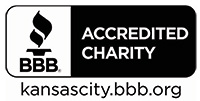Continue Supporting Our Work After Your Lifetime
Beneficiary Designations
Passionate about supporting Rose Brooks Center with ending the cycle of domestic violence even after your lifetime? It's not only possible, it's easy to do with a beneficiary designation. Just name Rose Brooks Center as a beneficiary to receive assets such as retirement plans and life insurance policies after you're gone. You simply fill out a form that is entirely separate from your will—which makes this approach an easy way to give.
Not only is it an easy way to give, but it's also flexible—you aren't locked into the choices you make today. You can review and adjust beneficiary designations anytime you want.

Want to learn more about making tax-wise gifts? Download our FREE guide Beneficiary Designations: The 3 Easiest Ways to Leave Your Legacy.
Check Out This Potential Scenario
 Robert and Carol treasure the financial help they've been able to give their children and Rose Brooks Center over the years. Now that their kids are grown, Robert and Carol changed their estate plan so it could work harder for the people and causes they love. The couple updated their will to leave stocks and real estate to their kids. And they left us a $75,000 IRA to be transferred after their death. Because Rose Brooks Center is tax-exempt, all $75,000 will help support our mission.
Robert and Carol treasure the financial help they've been able to give their children and Rose Brooks Center over the years. Now that their kids are grown, Robert and Carol changed their estate plan so it could work harder for the people and causes they love. The couple updated their will to leave stocks and real estate to their kids. And they left us a $75,000 IRA to be transferred after their death. Because Rose Brooks Center is tax-exempt, all $75,000 will help support our mission.
If Robert and Carol had left the IRA to their children, approximately $18,000* would have gone to pay federal income taxes—leaving only $57,000 for their family's use. Robert and Carol are happy knowing they are making the most of their hard-earned money thanks to their updated estate plan.
*Based on an assumption of a 24% marginal income tax bracket.
See How It Works
Learn How to Fund It
You can name us beneficiary of the following assets:
Information contained herein was accurate at the time of posting. The information on this website is not intended as legal or tax advice. For such advice, please consult an attorney or tax advisor. Figures cited in any examples are for illustrative purposes only. References to tax rates include federal taxes only and are subject to change. State law may further impact your individual results. California residents: Annuities are subject to regulation by the State of California. Payments under such agreements, however, are not protected or otherwise guaranteed by any government agency or the California Life and Health Insurance Guarantee Association. Oklahoma residents: A charitable gift annuity is not regulated by the Oklahoma Insurance Department and is not protected by a guaranty association affiliated with the Oklahoma Insurance Department. South Dakota residents: Charitable gift annuities are not regulated by and are not under the jurisdiction of the South Dakota Division of Insurance.


